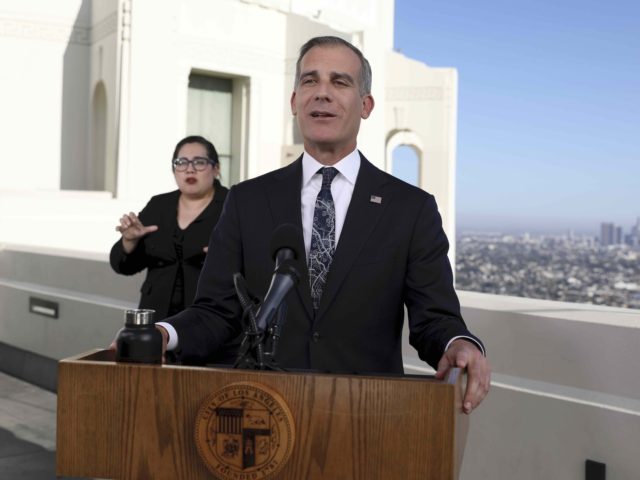Los Angeles Mayor Eric Garcetti told the city Monday evening in his annual “State of the City” address that L.A. was more “just” and “forward-looking” after a year of pandemic, riots, and economic shock.
“Through our pain and our trauma, we showed who we are, and defined what we believe,” Garcetti said.
Speaking from the iconic Griffith Observatory, the mayor struck a more optimistic tone than he had in 2020, when he told the city: “This is the worst it’s ever been.”
He had tweeted earlier that the state of the city was “strong, & bruised––bursting w/ joyous possibility, while cracking with sorrow.”
A year after Garcetti put city workers on furlough due to anticipated budget shortfalls, and cut several city departments — including a $150 million cut to the Los Angeles Police Department (LAPD) — Garcetti boasted that he would unveil the “biggest city budget I’ve ever presented,” and the “most progressive.”
The new spending has been made possible by President Joe Biden’s recent $1.9 trillion “COVID relief” bill, which included ample spending for other programs and for bailouts of Democrat-run cities and states.
Garcetti called his new budget the “Justice Budget,” saying that the top priority of city government, after fighting the coronavirus pandemic, is to create a more just city and to “make up for the wrongs of the past.”
The mayor promised to allow local businesses to return to work “so that you can reopen, hire up, and spread the wealth.” He also proposed to spend $25 million to write $5,000 checks to 5,000 businesses in the city.
Garcetti also said L.A. had to face its past, when “maps of our city were drawn to protect the wealth of white people, and destroy the wealth of black people and other people of color.” He said that the pandemic had provided an opportunity to address homelessness, which disproportionately affected minorities.
Garcetti also promised to spend nearly $1 billion on ending the homeless crisis in the city, which — despite the city’s purchases of buildings during the pandemic — has seen tent cities spring up across the city. He called on the federal government to “declare a national right to housing.”
The mayor also announced a new terminal at LAX, “Terminal 9,” and plans to build a “people-mover” between terminals.
Moreover, he said, “justice” would mean investing not only in physical infrastructure, but in what he called “our community infrastructure.”
He also announced cleaning jobs for young people and homeless people: “This city may be a mess right now, but we’re going to clean it up.”
The city would also pay the “DACA fees” for illegal aliens who arrived as minors and were granted a reprieve under the Obama administration’s Deferred Action for Childhood Arrivals” program.
Oddly, Garcetti also described poverty as an “addiction”: “We must end America’s addiction to poverty,” he said. He announced a new pilot program for a universal basic income grant, which would spend $24 million, providing $1,000 per month to 2,000 households in the city.
The mayor also proposed a city “freer from fear.” He said that police officers have been “burdened with responsibilities they never asked for,” and that the burden needed to be shared.
On public safety, Garcetti said he would oppose efforts to “defund the police.” But he did not propose to “re-fund” the police, either.
Rather than reversing last year’s budget cuts, Garcetti proposed “investing in the alternatives to policing” that he said would prevent crime.
As an example, Garcetti announced a new program to send unarmed crisis response teams to answer some emergency calls, called the Therapeutic Unarmed Response to Neighborhoods (TURN). He also announced $33 million for specially-trained teams to encourage reconciliation as a means to stop gang violence. But he said nothing about any plans to use the city’s new infusion of cash to restore funding for the LAPD.
Garcetti also announced funding for a “climate emergency mobilization office” and other environmental initiatives. He promised that the Los Angeles Department of Water and Power would provide power that is 80% renewable and 97% carbon-free by 2030. To do that, he promised to build a wind farm in New Mexico and to import solar power from the Navajo Nation, among other sources.
He also promised “public acknowledgment of institutional racism,” and proposed to build a memorial to the victims of the 1871 lynching of 18 Chinese residents, as an effort to fight anti-Asian hate crimes.
Moreover, Garcetti also promised to create a commission to study the possibility of creating a “slavery reparations program for black Angelenos.”
Slavery had a very limited, and illicit, history in California, which entered the Union in 1850 as a free state.
Joel B. Pollak is Senior Editor-at-Large at Breitbart News and the host of Breitbart News Sunday on Sirius XM Patriot on Sunday evenings from 7 p.m. to 10 p.m. ET (4 p.m. to 7 p.m. PT). He is the author of the recent e-book, Neither Free nor Fair: The 2020 U.S. Presidential Election. His recent book, RED NOVEMBER, tells the story of the 2020 Democratic presidential primary from a conservative perspective. He is a winner of the 2018 Robert Novak Journalism Alumni Fellowship. Follow him on Twitter at @joelpollak.

COMMENTS
Please let us know if you're having issues with commenting.